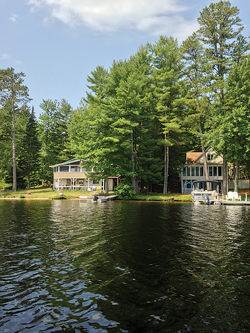|
This editorial is about how personal experiences can influence thinking about public policies that involve the oil and gas industry. My daughter has married into a family in Massachusetts that loves outdoor activities. In mid-July, my wife and I had the opportunity to visit the family’s “camp” at a lake in Maine. Each camp consists of a lake house, an assortment of small watercraft (powerboat, kayak and/or canoe), and a float that serves as a platform for swimming. At this particular lake in Maine, there are a hundred or more such camps along the water’s edge. Each summer, the lake is a venue for a variety of outdoor activities. The ownership of a camp is transferred from one generation to the next. Many of today’s camp owners are fourth- or fifth-generation residents.
To most of us in the oil and gas states, a drilling rig, or a line of pumpjacks across the horizon, are picturesque sights. But, to the people in Maine or other such pristine settings, oil and gas activity can be seen as a threat to their dream of passing on the nature’s bounty to the next generations. I think the oil and gas industry should be cognizant of such motivations and make every effort to blend into the local environment and minimize visual, chemical and noise pollution as much as possible. Stay off the front pages. The Santa Barbara beach spill (1969), Piper Alpha explosion (1988), Exxon Valdez leak (1989), Deepwater Horizon blowout (2010), and recent oil train derailments, have made front page news, and scarred the oil and gas industry’s image. Of course, oil and gas activity is inherently dangerous. We should, however, do all that is humanly possible to prevent catastrophic incidents. Reduce pollution. The industry should continually invest in technology to install leak-proof valves and reduce fugitive emissions. Fracing risks should be minimized through frac-water recycling and responsible water management. Traffic through urban areas should be minimized. Noise reduction, through quieter compressors and engines, should be a high priority. We should continually improve pad usage and multilateral drilling, to reduce the number of wells needed to drain a particular formation. Oil-and-gas-to-wire technology. Energy transportation by electricity is perhaps the most efficient and convenient. Electrical vehicles are also becoming increasingly viable as a mode of transportation. We should develop small-scale power plants, nearer to oil and gas fields and gathering facilities, that can convert the fossil fuels to electricity and transfer the energy to the grid as soon as possible. Where’s the money? I’m sure you’re already thinking about how we can pay for such utopian solutions. The oil and gas industry has long considered delivering “cheap and plentiful” energy as its mission statement. “Plentiful” is appropriate, but “cheap” may no longer be compatible with the demands for greater attention to health, safety and the environment. We would have to pass on the additional costs to the consumers. After all, haven’t people come to terms with paying more for “globally responsible” products (think Starbucks) and “organic” produce? |

- Prices and governmental policies combine to stymie Canadian upstream growth (February 2024)
- U.S. producing gas wells increase despite low prices (February 2024)
- U.S. drilling: More of the same expected (February 2024)
- U.S. oil and natural gas production hits record highs (February 2024)
- U.S. upstream muddles along, with an eye toward 2024 (September 2023)
- Canada's upstream soldiers on despite governmental interference (September 2023)
- Applying ultra-deep LWD resistivity technology successfully in a SAGD operation (May 2019)
- Adoption of wireless intelligent completions advances (May 2019)
- Majors double down as takeaway crunch eases (April 2019)
- What’s new in well logging and formation evaluation (April 2019)
- Qualification of a 20,000-psi subsea BOP: A collaborative approach (February 2019)
- ConocoPhillips’ Greg Leveille sees rapid trajectory of technical advancement continuing (February 2019)



